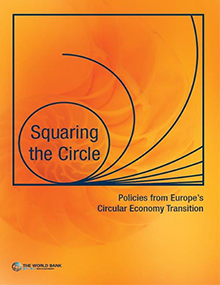
Over the past decade, material efficiency and resource productivity have surfaced on the global policy agenda. Europe has made important progress in achieving material efficiency gains. The transition, however, is still in its infancy. More than 87% of the European Union's resource consumption still comes from primary materials, and overall the European Union's waste generation keeps increasing.
This report reviews Europe’s experience in spearheading circular economy policy. Its aim is not only to highlight its features and accomplishments, but also to identify existing barriers to future progress and key measures to overcome them. Its objective is contributing to circular economy policy development within the European Union and identifying lessons from the EU’s circular economy leadership that can be of benefit to non-European countries.
It shows that achieving material decoupling is possible through a far-reaching suite of policies aimed at creating the incentives to ensure an adequate pricing of natural resources; providing information allowing economic actors to take better decisions; enabling institutions to mainstream circularity as a whole-of-government agenda; and unlocking investments to support uptake among producers and consumers. https://www.worldbank.org/en/region/eca/publication/squaring-circle-europe-circular-economy-transition
